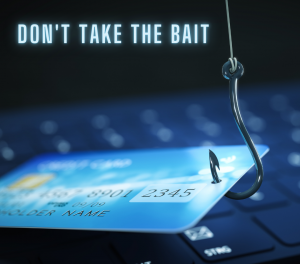Don’t Get Caught by a Phish!
March 28, 2023
Phishing is a serious threat to your online security. It’s the act of tricking someone into giving away their personal information, usually through a fake website or email. But let’s face it, we all need a good laugh every once in a while, so let’s see if we can inject a little humor into this serious topic.
First, let’s talk about some common phishing tactics. One is the classic “Nigerian Prince” scam. You know the one, where someone claiming to be a wealthy Nigerian prince emails you and offers to share their wealth with you if you help them transfer the money out of the country. If you fall for this, you’ll likely end up handing over your bank account information or sending them money. But seriously, who falls for this? I mean, I don’t even trust Nigerian princes I meet in person, let alone ones I meet online.
Another tactic is the fake login page. Hackers will create a fake login page that looks just like the real thing, and then send you an email that looks like it’s from a legitimate company, asking you to login to your account to verify some information. But if you’re paying attention, you’ll notice that the URL is slightly different than the real company’s website. For example, instead of www.bankofamerica.com, it might be www.bankofamerica1.com. Come on hackers, you can do better than that. At least make it a little less obvious.
So, how can you protect yourself from phishing? One simple rule is to never give out personal information, especially account numbers or passwords, to anyone who contacts you online. If you’re not sure if an email or website is legitimate, call the company directly and ask. And always make sure you’re on the real website before entering any sensitive information. Another rule is to never click a link in an email. If you believe the message may be legit, and you actually do business with said company, go directly to their website in a separate browser and login as you normally would…if they’re trying to reach you, you should see an alert on your account online.
In conclusion, phishing is no laughing matter. But with a little humor, we can lighten the mood and remind ourselves to stay vigilant against these scams. Just remember, if a Nigerian prince offers to share their wealth with you, it’s probably too good to be true.
– Lee Frazier, Founder of ChiroSafe, has over 30 years experience in IT and cybersecurity. He has a passion for using his knowledge and experience, and a group of specially curated enterprise level software tools, to ease the burden and confusion of cybersecurity and HIPAA HITECH compliance for chiropractors. Lee and his team at ChiroSafe serve as a trusted partner in securing the sensitive data and systems of their clients in 23 states, providing customized solutions, 24/7 proactive monitoring, and exceptional customer service across five time zones.




Leave a Reply
Want to join the discussion?Feel free to contribute!